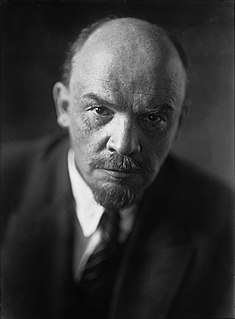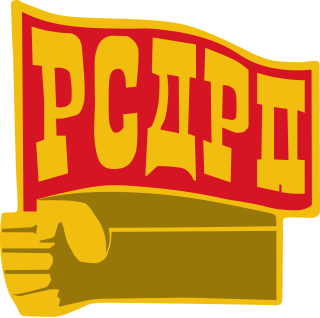Related Research Articles

Leninism is a political ideology developed by Russian Marxist revolutionary Vladimir Lenin that proposes the establishment of the dictatorship of the proletariat led by a revolutionary vanguard party as the political prelude to the establishment of communism. The function of the Leninist vanguard party is to provide the working classes with the political consciousness and revolutionary leadership necessary to depose capitalism in the Russian Empire (1721–1917). Leninist revolutionary leadership is based upon The Communist Manifesto (1848), identifying the communist party as "the most advanced and resolute section of the working class parties of every country; that section which pushes forward all others." As the vanguard party, the Bolsheviks viewed history through the theoretical framework of dialectical materialism, which sanctioned political commitment to the successful overthrow of capitalism, and then to instituting socialism; and, as the revolutionary national government, to realise the socio-economic transition by all means.

Trotskyism is the political ideology and branch of Marxism developed by Ukrainian-Russian revolutionary Leon Trotsky and some other members of the Left Opposition and Fourth International. Trotsky self-identified as an orthodox Marxist, a revolutionary Marxist, and Bolshevik–Leninist, a follower of Marx, Engels, and 3L: Vladimir Lenin, Karl Liebknecht, and Rosa Luxemburg. He supported founding a vanguard party of the proletariat, proletarian internationalism, and a dictatorship of the proletariat based on working-class self-emancipation and mass democracy. Trotskyists are critical of Stalinism as they oppose Joseph Stalin's theory of socialism in one country in favour of Trotsky's theory of permanent revolution. Trotskyists criticize the bureaucracy and anti-democratic current developed in the Soviet Union under Stalin.

The Social Democratic Party of Lithuania is a centre-left and social democratic political party in Lithuania. Founded as an underground Marxist organization in 1896, it is the oldest extant party in Lithuania. During the time of the Soviet Union, the party went into exile, emerging once again in Lithuania in 1989.
Social fascism was a theory that was supported by the Communist International (Comintern) and affiliated communist parties in the early 1930s that held that social democracy was a variant of fascism because it stood in the way of a dictatorship of the proletariat, in addition to a shared corporatist economic model.

The Social Democracy of the Kingdom of Poland and Lithuania, Lithuanian: Lenkijos karalystės ir Lietuvos socialdemokratija, LKLSD), originally the Social Democracy of the Kingdom of Poland (SDKP), was a Marxist political party founded in 1893 and later served as an autonomous section of the Russian Social Democratic Labour Party. It later merged into the Communist Workers Party of Poland. Its most famous member was Rosa Luxemburg.
The Revolutionary Sotsial-Demokrat Organisation was an organisation of Russian socialists, formed by the members of the Emancipation of Labour group and their supporters in May 1900, following the split of the Union of Russian Social-Democrats Abroad at its Second Congress. In October 1901, on the proposal of Vladimir Lenin, the revolutionary Sotsial-Demokrat organisation united with the Iskra organisation abroad into the League of Russian Revolutionary Social-Democracy Abroad.
Union of Russian Social-Democrats Abroad was an organization of emigrant Russian socialists, set up in Geneva in 1894 on the initiative of the Emancipation of Labour group. It had its own printing press for issuing revolutionary literature, and published the newspapers Rabotnik and Listok Rabotnika. Initially, the Emancipation of Labour group directed the Union and edited its publications. But afterwards opportunist elements gained the upper hand within the Union.

Raphael Abramovitch Rein (1880–1963), best known as Raphael Abramovitch, was a Russian socialist, a member of the General Jewish Workers' Union in Lithuania, Poland and Russia (Bund), and a leader of the Menshevik wing of the Russian Social-Democratic Workers' Party (RSDRP).

Russian Socialist Movement is a left-wing to far left political organisation in Russia. It was created in 2011 by the merging of various left-wing, socialist, anti-capitalist and communist organisations. It is strongly critical of President Vladimir Putin.

Centrism has a specific meaning within the Marxist movement, referring to a position between revolution and reformism. For instance, the Independent Social Democratic Party of Germany (USPD) and Independent Labour Party (ILP) were both seen as centrist because they oscillated between advocating reaching a socialist economy through reforms and advocating revolution. The parties that belonged to the so-called Two-and-a-half and Three-and-a-half Internationals, who could not choose between the reformism of the social democrat Second International and the revolutionary politics of the Communist Third International, were also exemplary of centrism in this sense. They included the Spanish Workers' Party of Marxist Unification (POUM), the Independent Labour Party (ILP) and Poale Zion.
Central committee is the common designation of a standing administrative body of communist parties, analogous to a board of directors, of both ruling and nonruling parties of former and existing socialist states. In such party organizations, the committee would typically be made up of delegates elected at a party congress. In those states where it constituted the state power, the central committee made decisions for the party between congresses and usually was responsible for electing the Politburo. In non-ruling communist parties, the central committee is usually understood by the party membership to be the ultimate decision-making authority between congresses once the process of democratic centralism has led to an agreed-upon position.

Revolutionary spontaneity, also known as spontaneism, is a revolutionary socialist tendency that believes the social revolution can and should occur spontaneously from below by the working class itself, without the aid or guidance of a vanguard party and that it cannot and should not be brought about by the actions of individuals such as professional revolutionaries or political parties who might attempt to foment such a revolution.

The Mensheviks were one of the three dominant factions in the Russian socialist movement, the others being the Bolsheviks and Socialist Revolutionaries.

The Russian Social Democratic Labour Party, also known as the Russian Social Democratic Workers' Party or the Russian Social Democratic Party, was a socialist political party founded in 1898 in Minsk.
Soviet democracy, or council democracy, is a political system in which the rule of the population by directly elected soviets is exercised. The councils are directly responsible to their electors and bound by their instructions using a delegate model of representation. Such an imperative mandate is in contrast to a free mandate, in which the elected delegates are only responsible to their conscience. Delegates may accordingly be dismissed from their post at any time or be voted out (recall).

Isaak Khristoforovich Lalayants was a Russian revolutionary, Marxist, Bolshevik and comrade-in-arms of Vladimir Lenin.